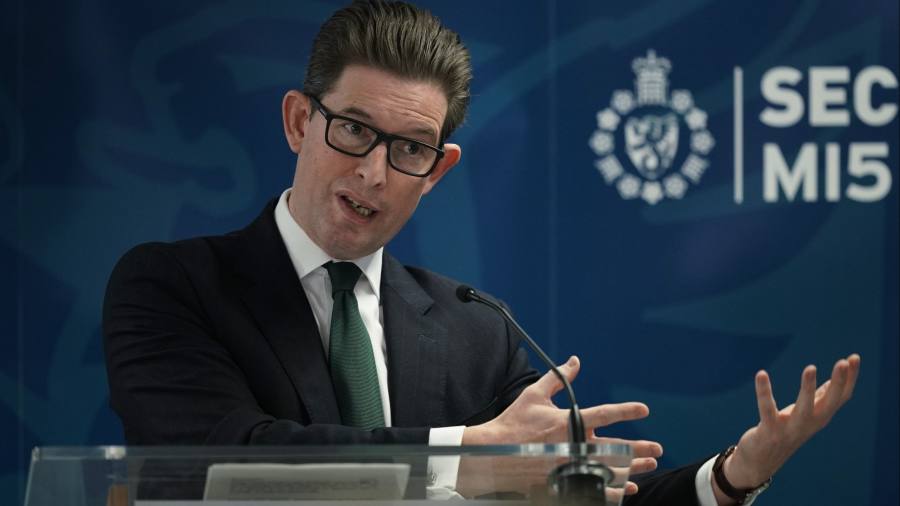
The Chinese are playing a “long game” seeking to co-opt and influence not just MPs but also people much earlier in their careers in public life, in what the head of Britain’s domestic security agency said was part of a “game-changing strategic challenge”.
Delivering his annual threat assessment on Wednesday, Ken McCallum said MI5 was making “the biggest shifts in a generation” as it faced state adversaries in China, Russia and Iran, who were not “squeamish about the tactics they deploy”. UK security, values and democratic institutions were at stake, he added.
The breadth of tactics Beijing used to redesign the international system and apply pressure to those challenging the regime’s perceived core interests presented a “different order of challenge” to the immediate one posed by Moscow.
Using a football analogy, he said China was “trying to rewrite the rule book, to buy the league, to recruit our coaching staff to work for them”.
Beijing uses all means at its disposal to monitor and intimidate the Chinese diaspora, he added, noting an incident last month in which a pro-democracy protester was assaulted outside the Chinese consulate in Manchester.
As part of efforts to manipulate opinion in its favour, Chinese authorities were also “cultivating assets” in academia, business and in parliament. In an indication of the scope of ambition and scale of threat posed, they were building “early stage” relationships with potential future politicians, including at local government level by “gradually building a debt of obligation”.
In a rare intervention earlier this year, the agency warned MPs that a Chinese agent, who it identified as a London-based solicitor, had been “engaged in political interference activities” in parliament.
McCallum said prime minister Rishi Sunak, who has retreated from the more overtly hostile stance to Beijing adopted by his predecessors Liz Truss and Boris Johnson in favour of greater engagement, had to “balance a much more complex relationship”.
MI5, he said, was uniquely focused on the threats that Beijing poses, which were likely to grow as president Xi Jinping consolidates power on an “indefinite basis”.
Meanwhile, Russia’s full-scale invasion of Ukraine in February had raised issues that some people in the UK thought “had been consigned to the history books”. Continuing his football analogy, McCallum said Moscow thought nothing of “throwing an elbow in the face” and “routinely cheat[ed] to get its way”.
The UK has had success in getting “some of their players thrown off”, he said, pointing to Britain and its European allies’ expulsion of more than 600 Russian officials since the invasion of Ukraine, including more than 400 deemed to be spies.
He said the move had struck “the most significant blow against the Russian intelligence services in recent European history” but warned that the UK must be ready to counter aggression from Moscow “for years to come”.
McCallum said the agency was alive to the risk of alignment between China, Russia and Iran, and that they amplify strengths by “loaning players to each other”.
Iran, which he considered “the state actor which most frequently crosses into terrorism”, projects a direct threat to UK security, he said. At its most extreme this included “ambitions to kidnap or even kill British or UK-based individuals perceived as enemies of the regime”. Iran had made at least 10 such threats since January.
Moving on to the risks posed by non-state threats, he said MI5 and the police had together disrupted eight late-stage terrorist plots in the past year, bringing the number of potentially deadly attacks stopped since the start of 2017 to 37.
The threat of terrorism remained live, McCallum warned, with about three-quarters of cases linked to Islamist extremists, and another quarter from the extreme right, as underscored by the “horrible petrol bomb attack” on a migrant centre in Dover last month.